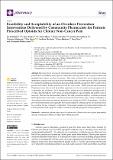Files in this item
Feasibility and acceptability of an overdose prevention intervention delivered by community pharmacists for patients prescribed opioids for chronic non-cancer pain
Item metadata
| dc.contributor.author | Schofield, Joe | |
| dc.contributor.author | Parkes, Tessa | |
| dc.contributor.author | Mercer, Fiona | |
| dc.contributor.author | Foster, Rebecca | |
| dc.contributor.author | Hnízdilová, Kristina | |
| dc.contributor.author | Matheson, Catriona | |
| dc.contributor.author | Steele, Wez | |
| dc.contributor.author | McAuley, Andrew | |
| dc.contributor.author | Raeburn, Fiona | |
| dc.contributor.author | Skea, Lucy | |
| dc.contributor.author | Baldacchino, Alexander | |
| dc.date.accessioned | 2023-05-31T16:30:07Z | |
| dc.date.available | 2023-05-31T16:30:07Z | |
| dc.date.issued | 2023-05-22 | |
| dc.identifier | 286944392 | |
| dc.identifier | 8a311c0e-81d3-493b-912a-e59cf3b31aee | |
| dc.identifier.citation | Schofield , J , Parkes , T , Mercer , F , Foster , R , Hnízdilová , K , Matheson , C , Steele , W , McAuley , A , Raeburn , F , Skea , L & Baldacchino , A 2023 , ' Feasibility and acceptability of an overdose prevention intervention delivered by community pharmacists for patients prescribed opioids for chronic non-cancer pain ' , Pharmacy , vol. 11 , no. 3 , 88 . https://doi.org/10.3390/pharmacy11030088 | en |
| dc.identifier.issn | 2226-4787 | |
| dc.identifier.other | Jisc: 1113877 | |
| dc.identifier.other | pmcid: PMC10204494 | |
| dc.identifier.other | pmid: 37218970 | |
| dc.identifier.other | ORCID: /0000-0002-5388-7376/work/136288632 | |
| dc.identifier.uri | https://hdl.handle.net/10023/27717 | |
| dc.description | Funding: This research was funded by the Scottish Government’s Drug Deaths Taskforce, grant number DDTF-RF-19. | en |
| dc.description.abstract | There have been increases in prescriptions of high strength opioids for chronic non-cancer pain (CNCP), but CNCP patients perceive themselves as being at low risk of opioid overdose and generally have limited overdose awareness. This study examined how an overdose prevention intervention (opioid safety education, naloxone training, and take-home naloxone (THN)) delivered by community pharmacists for patients prescribed high-strength opioids for CNCP would work in practice in Scotland. Twelve patients received the intervention. CNCP patients and Community Pharmacists were interviewed about their experiences of the intervention and perceptions of its acceptability and feasibility. CNCP patients did not initially perceive themselves as being at risk of overdose but, through the intervention, developed insight into opioid-related risk and the value of naloxone. Pharmacists also identified patients' low risk perceptions and low overdose awareness. While pharmacists had positive attitudes towards the intervention, they outlined challenges in delivering it under time and resource pressures and during the COVID-19 pandemic. Overdose prevention interventions are required in the CNCP population as this group has elevated risk factors for overdose but are commonly overlooked. Customised overdose prevention interventions for CNCP patients attend to gaps in overdose awareness and risk perceptions in this population. | |
| dc.format.extent | 17 | |
| dc.format.extent | 856047 | |
| dc.language.iso | eng | |
| dc.relation.ispartof | Pharmacy | en |
| dc.subject | Naloxone | en |
| dc.subject | Community Pharmacists | en |
| dc.subject | Chronic Non-cancer Pain | en |
| dc.subject | Prescription Opioids | en |
| dc.subject | Overdose Prevention | en |
| dc.subject | Overdose Intervention | en |
| dc.subject | Opioid Overdose Risk | en |
| dc.subject | RM Therapeutics. Pharmacology | en |
| dc.subject | NDAS | en |
| dc.subject | SDG 3 - Good Health and Well-being | en |
| dc.subject | MCC | en |
| dc.subject.lcc | RM | en |
| dc.title | Feasibility and acceptability of an overdose prevention intervention delivered by community pharmacists for patients prescribed opioids for chronic non-cancer pain | en |
| dc.type | Journal article | en |
| dc.contributor.institution | University of St Andrews. School of Medicine | en |
| dc.contributor.institution | University of St Andrews. Centre for Minorities Research (CMR) | en |
| dc.contributor.institution | University of St Andrews. Population and Behavioural Science Division | en |
| dc.identifier.doi | 10.3390/pharmacy11030088 | |
| dc.description.status | Peer reviewed | en |
This item appears in the following Collection(s)
Items in the St Andrews Research Repository are protected by copyright, with all rights reserved, unless otherwise indicated.

